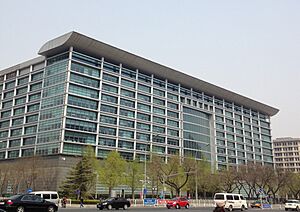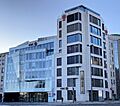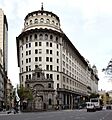Industrial and Commercial Bank of China facts for kids

ICBC head office in Beijing
|
|
|
Native name
|
中国工商银行
Zhōngguó Gōngshāng Yínháng |
|---|---|
| Public State-owned |
|
| Traded as | |
| ISIN | [https://isin.toolforge.org/?language=en&isin=CNE1000003G1 CNE1000003G1] |
| Industry | Financial services |
| Founded | 1984 |
| Headquarters |
Beijing
,
China
|
|
Key people
|
Liao Lin, chairman and president |
| Products | Finance and insurance, consumer banking, corporate banking, investment banking, investment management, global wealth management, private equity, mortgage loans, credit cards |
| Revenue | $105.4 billion (2018) |
|
Operating income
|
$53.68 billion (2018) |
$43.42 billion (2018) |
|
| AUM | |
| Total assets | |
| Total equity | $338.7 billion (2018) |
| Owner |
|
|
Number of employees
|
|
| Capital ratio | |
| Industrial and Commercial Bank of China | |||||||
|---|---|---|---|---|---|---|---|
| Simplified Chinese | 中国工商银行股份有限公司 | ||||||
| Traditional Chinese | 中國工商銀行股份有限公司 | ||||||
| Literal meaning | China Industrial and Commercial Bank, Company Limited by Shares | ||||||
|
|||||||
| Alternative Chinese name | |||||||
| Simplified Chinese | 中国工商银行 | ||||||
| Traditional Chinese | 中國工商銀行 | ||||||
|
|||||||
| Second alternative Chinese name | |||||||
| Chinese | 工行 | ||||||
|
|||||||
The Industrial and Commercial Bank of China (ICBC; Chinese: 中国工商银行) is the largest bank in China and in the world. It is measured by the total value of everything it owns, called its assets. ICBC was started on 1 January 1984. It grew out of the commercial banking parts of the People's Bank of China.
The Chinese government owns most of ICBC. This has been true even after the bank offered its shares to the public in 2006. By the end of 2021, the government controlled about 69.3% of the bank.
ICBC became the world's largest bank by assets in 2012. It has held this top spot ever since. In 2015, Forbes Global 2000 ranked it as the world's top public company. By the end of 2022, it was the third-largest bank in the world based on its market value. It is also one of the most profitable companies globally. The Financial Stability Board (FSB) considers it a "systemically important bank." This means it is so big that its failure could harm the entire financial system.
Some people who used to work at ICBC have gone on to hold important government jobs in China. For example, Yi Huiman became the Chairman of the China Securities Regulatory Commission. Pan Gongsheng became the Governor of the People's Bank of China.
Contents
How ICBC Started
Early Banking in China
After the Chinese Communist Revolution in 1949, China had a "monobank system." This meant that the People's Bank of China (PBC) handled all financial activities. In 1978-1979, China began to change its banking system. The PBC became a proper central bank, which manages the country's money supply. At the same time, new commercial banks were created. This led to a "two-tier banking system," with a central bank and separate commercial banks.
ICBC's Creation in 1984
In September 1983, the Chinese government decided to create a new organization. This organization would handle specific commercial banking tasks. So, on January 1, 1984, the Industrial and Commercial Bank of China (ICBC) was officially established. ICBC was the fourth specialized bank to be formed. It took over the "industrial credit and savings business" from the People's Bank of China. This allowed the PBC to focus on its role as a central bank. ICBC's main job was to manage deposits from people and businesses.
Growing Globally
ICBC opened its first branch outside China in Singapore in 1993. In 1999, it opened a branch in Luxembourg, which became its main office for Europe in 2011. In 2000, ICBC bought the Union Bank of Hong Kong and renamed it ICBC (Asia). This helped ICBC grow its business in Hong Kong.
In June 2005, ICBC started a joint company called ICBC Credit Suisse Asset Management in China. They worked with Credit Suisse First Boston and COSCO. By 2006, ICBC served 2.5 million business customers and 150 million individual customers.
Becoming a Public Company
Initial Public Offering (IPO)
Before ICBC offered its shares to the public, three big investors put money into the bank in April 2006. These "strategic investors" included Goldman Sachs, Dresdner Bank, and American Express. They invested a total of US$3.7 billion.
ICBC's shares were listed on both the Hong Kong Stock Exchange and Shanghai Stock Exchange on October 27, 2006. This was a very big event. It was the world's largest initial public offering (IPO) at that time, raising US$21.9 billion. An IPO is when a company sells its shares to the public for the first time. ICBC was also the first company to list its shares on both the Hong Kong and Shanghai stock exchanges at the same time.
On its first day of trading, ICBC's shares went up by almost 15% in Hong Kong. This showed strong interest from investors. Its market value reached US$156.3 billion, making it the fifth-largest bank in the world by value.
Recent Developments and Global Reach
Expanding Around the World
In July 2007, ICBC was ranked 30th globally based on its income. In August 2008, ICBC was allowed to open a branch in New York City, USA. This was a big step for a Chinese bank.
ICBC continued to open branches in many countries. On January 24, 2011, it opened an office in Madrid, Spain. In May 2011, it opened two branches in Pakistan, in Karachi and Islamabad. In November 2012, ICBC bought 80% of a bank in Argentina. This was the largest deal by a Chinese bank in Latin America. In Argentina, ICBC serves about 1 million individual customers and many businesses.
In 2013, during a difficult time with North Korea, ICBC stopped doing business with a North Korean bank. This bank was accused of helping to fund missile and nuclear programs.
In 2015, ICBC bought a bank in Turkey called TekstilBank. It renamed it ICBC Turkey. This helped ICBC grow its presence in the Middle East and Europe. ICBC also opened a branch in Kuwait City in 2014, becoming the first Chinese bank there.
In November 2016, ICBC received permission to accept deposits in Russia. In 2017, ICBC started using "robo-advisors" to help manage money for its customers. Robo-advisors are computer programs that give financial advice.
Cyber Attack in 2023
In November 2023, the US part of ICBC faced a ransomware attack. This type of attack involves hackers blocking access to computer systems until a payment is made. The attack was carried out by a group called Lockbit. It caused problems with some US Treasury trades, meaning the bank couldn't complete them right away. Other banks had to send their orders through different routes. Lockbit later said that ICBC paid the ransom.
Environmental Efforts
ICBC has shown interest in protecting the environment. In 2008, it became the first Chinese bank to adopt the Equator Principles. These are international rules for financial groups to make sure their projects are socially and environmentally responsible. ICBC also follows China's Green Credit Policy.
However, some environmental groups have criticized ICBC. They say the bank has not always followed its own environmental rules. For example, ICBC helped fund the Gilgel Gibe III Dam in Ethiopia, which has faced environmental concerns.
In 2021, ICBC and other state-owned banks received approval for a large "green fund." This fund, worth $13.6 billion, will support environmentally friendly projects. ICBC plans to invest 8 billion yuan in the National Green Development Fund. This money will help finance projects along the Yangtze River that are good for the environment.
ICBC's Subsidiaries
ICBC has many companies that it owns or controls, called subsidiaries. In mainland China, a major one is ICBC Credit Suisse Asset Management. Around the world, ICBC has subsidiaries like ICBC (Asia) in Hong Kong, ICBC (Macau), and ICBC Standard Bank in London. It also has ICBC (Europe) in Luxembourg, ICBC Turkey in Istanbul, and ICBC Argentina in Buenos Aires. There are also other important subsidiaries in countries like Thailand, Pakistan, Switzerland, Canada, USA, and Mexico. ICBC (Europe) S.A. has branches in major European cities like Paris, Amsterdam, Brussels, Milan, Madrid, Barcelona, Warsaw, and Lisbon.
Leadership
The bank has had several important leaders over the years:
- Jiang Jianqing was president from 2000 to 2005, and then chairman from 2005 to 2016.
- Yi Huiman was president from 2013 to 2016, and then chairman from 2016 to 2019.
- Chen Siqing was chairman from 2019 to 2024.
- Liao Lin has been president since January 2021 and chairman since February 2024.
Awards and Recognition
ICBC has received many awards for its size and success. It has been named the Forbes Global 2000 – the World's Largest Public Company.
Images for kids
-
ICBC building in Beijing
-
ICBC branch in Dalian
-
ICBC building in Kaifeng
-
ICBC building in Shenyang
-
ICBC branch in Qingdao
-
ICBC building in Nanjing
-
ICBC tower in Shanghai
-
ICBC building in Ningbo
-
ICBC at Kingkey Regent Oriental Hotel in Shenzhen
-
ICBC tower in Tokyo
-
ICBC tower in Karachi
-
ICBC building in Luxembourg
-
ICBC building in Warsaw
-
ICBC building (formerly First National Bank of Boston) in Buenos Aires
See also
 In Spanish: Banco Industrial y Comercial de China para niños
In Spanish: Banco Industrial y Comercial de China para niños
 | Charles R. Drew |
 | Benjamin Banneker |
 | Jane C. Wright |
 | Roger Arliner Young |



















